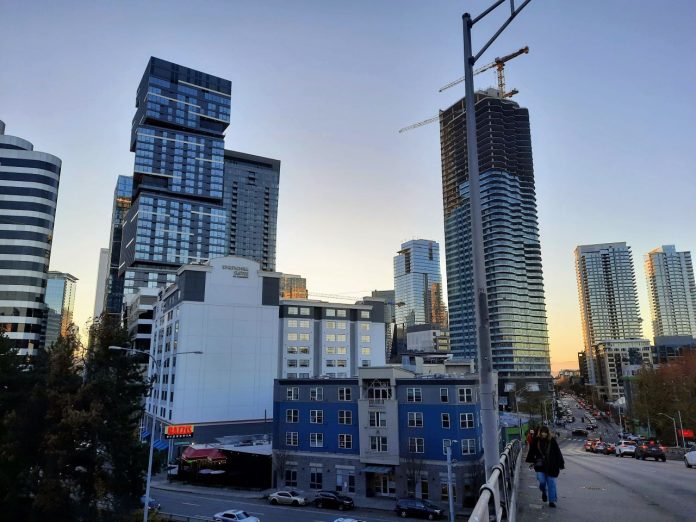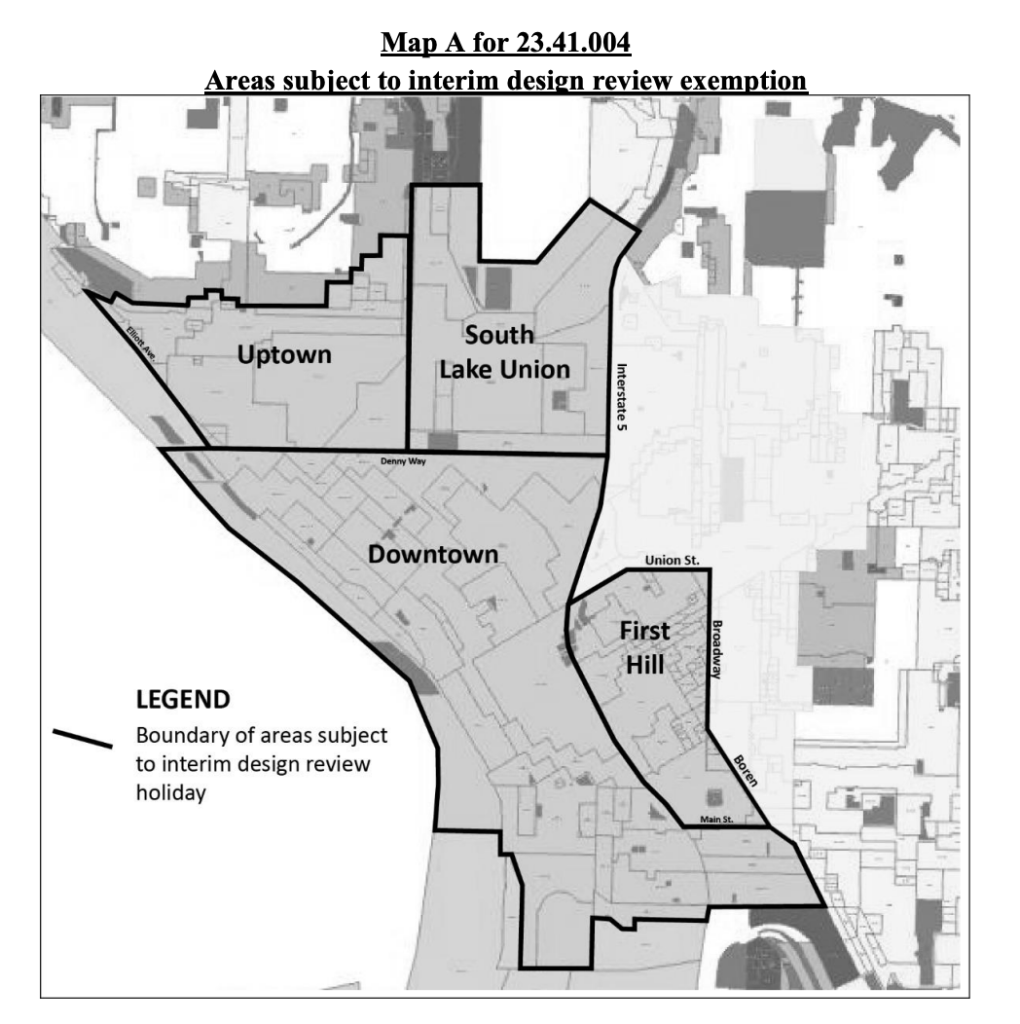
On Thursday, the Seattle Department of Construction and Inspections (SDCI) issued draft legislation to exempt qualifying new residential, hotel, and laboratory construction projects from design review in most of the greater downtown core. This proposal constituted another element of Seattle Mayor Bruce Harrell’s Downtown Activation Plan (DAP) and yet another under the land use reform category.
The legislation would apply for three years and provide design review exemptions in the Downtown, Uptown, South Lake Union, and First Hill Urban Centers for the following types of projects:
- Mixed-use projects where at least 50% of floor area is hotel use;
- Mixed-use projects where at least 50% of floor area is residential;
- Projects that include any research and development lab uses; and
- Projects that are fully residential.
Not included in the proposed legislation are projects that are mostly conventional office space, a reflection that the City is anticipating lower office demand with high rates of work-from-home for white collar workers and is shifting to a strategy to encourage residential growth to activate downtown.
SDCI has indicated the legislation would have minimal impact on Chinatown-International District and Pioneer Square or landmark districts like Pike Place Market since projects are already exempt from traditional design review in those areas and instead go through special review districts. Though projects exempt from design review in those areas can and would still be able to voluntarily opt-into the program to receive flexibility from development regulations. It does not appear the City thinks such an option is likely to be well-used.

Projects eligible for the exemption would need to show that they don’t have any special features, such as a corresponding land use application that requires approval by the city council or a landmark structure on-site, that would need to be addressed through permit review.
In addition to exemption from design review, eligible projects would be able to seek waivers and modifications for certain types of development regulations. The list of potential waivers and modifications is lengthy, but not as expansive as in the regular design review program for eligible development standard departures. Applicants would need to show that approval of waivers and modifications would “address siting constraints or result in an increased number of dwelling units or lodging rooms being constructed,” according to the proposed legislation.
Most residential, hotel, and research and development lab projects seek departures, at least those subject to design review in the area proposed for design review exemption, according to a report by City planners. The reports notes that:
“The 46 residential and hotel-related development proposals received approximately:
- 40 departures from Land Use Code requirements involving development standards that manage the location of the building on the site, such as setbacks between structures or from lot lines;
- 48 departures from Land Use Code requirements involving standards related to features of new development, such as ground-level uses, landscaping, the amount of wall area with windows or blank spaces, or adjustments in automobile access, parking, or weather protection;
For the 9 non-residential development proposals that included laboratory components:
- 42 total departures were proposed, which averages out to 4-5 departures per development.
- Most of these were for building-siting departures, in proportions similar to other nonresidential developments.”
The proposed set of waivers and modifications is based upon a review of these projects for the most commonly requested and granted departures from development regulations. Review of the waivers and modifications would be conducted as non-appealable ministerial review of a project application.
Reform of Seattle’s design review program has been a priority by housing advocates for many years now. Interim changes were adopted during the pandemic to streamline reviews with further changes adopted last year to enhance and extend exemptions for affordable and permanent supportive housing and provide new exemptions for other projects that commit to providing on-site affordable housing under the Mandatory Housing Affordability program for residential development.
A new state law is set to push the City to revise its design review program by, among other things, adopting “clear and objective development regulations” in most areas of the city by July 2025.
For now, the Mayor’s proposed legislation is set to join two other land use pieces of the Mayor’s DAP currently awaiting city council review and approval. Those proposals seek to make it easier to fill vacant storefronts in parts of Downtown Seattle, Uptown, and South Lake Union with less active uses and encourage conversion of vacant commercial space (mostly offices) to residential uses. Last fall, the Mayor was successful in winning council approval of two Downtown Seattle rezones to facilitate more highrise housing and hotels.
Barring an appeal of the proposed design review exemption legislation, a formal ordinance could be transmitted to the city council in a matter of months for final adoption.
Doug Trumm is publisher of The Urbanist. An Urbanist writer since 2015, he dreams of pedestrian streets, bus lanes, and a mass-timber building spree to end our housing crisis. He graduated from the Evans School of Public Policy and Governance at the University of Washington in 2019. He lives in Seattle's Fremont neighborhood and loves to explore the city by foot and by bike.

